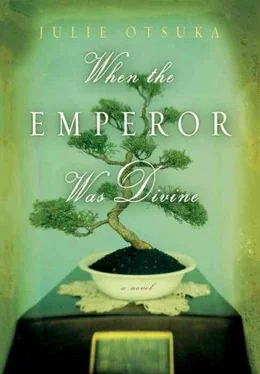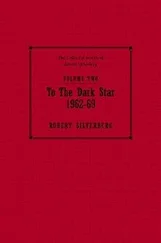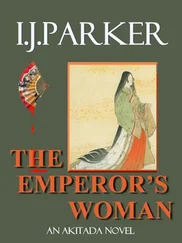During the daytime she spent hours scrubbing the layers of dirt off the floors. “Who were these people?” she asked us again and again. She dusted and swept and cooked. She washed the windows with lemon juice and vinegar and replaced the broken glass panes with tin squares. On sunny afternoons she went out into the backyard in her work gloves and her floppy straw hat and she raked up the fallen leaves into piles, which we jumped in and scattered once more to the wind. She cleared the weeds from the overgrown pathways. She pruned back the hedges. She tore out the rotting trellis from the middle of the garden, which had seeded itself and gone wild. Deep down in the underbrush, she found things. A doll’s head. A lady’s black silk stocking. A stone Buddha lying facedown in the dirt. “So that’s where you were.” We lifted it for her gently, brushed off the fat belly, saw the enormous round head, uptilted, still laughing.
In the evening, as darkness fell and casseroles rose and men did or did not come home from the office, we often found her sitting on the high metal stool in the kitchen with her back to the window, slowly filing her nails.
“So quiet,” she’d say.
WE USED TO LIVE in the desert. We used to wake, every morning, to the blast of a siren. We used to stand in line for our meals three times a day. We used to stand in line for our mail. We used to stand in line to get coal. We used to stand in line whenever we had to shower or use the latrine. We used to hear the wind hissing day and night through the sagebrush. We used to hear coyotes. We used to hear every word spoken by our neighbors on the other side of the thin barrack wall. Where’s my razor, where’s my comb, who took my toothpaste… ? We used to steal lumber from the lumber pile when the guards were not looking. We used to steal gum from the canteen. We used to place nails on the tire tracks left behind by the Jeeps that made the rounds at the end of the day. We used to go swimming in the irrigation ditch. We used to play marbles. We used to play hopscotch. We used to play war. I’ll be MacArthur and you be the enemy! We used to try and imagine what it would be like when we finally returned home.
Our phone would ring off the hook. (“How was it?”)
Neighborhood ladies bearing angel food cakes would line up at our front door to welcome us back (“Yoo hoo, we know you’re in there!”).
On Saturday afternoons we’d arrive at the picture show just as the lights were going down and make everyone stand up in their seats to let us pass by (“Excuse me, pardon me, pardon me…”).
On Sundays we’d spend all day in the park flying kites.
We would accept all invitations. Go everywhere. Do everything, to make up for all the years we had missed while we were away. Yes, the world would be ours once again: warm days, blue skies, the endless green lawns, cold frosted glasses of pink lemonade, bicycles skidding across the gravel, little white dogs on long leashes with their noses pressed hard to the ground, the streetlamps coming on every evening at dusk, in the distance the clang of the trolley cars, small voices crying out, No, I won’t, the sound of screen doors slamming, the quick patter of footsteps running across driveways, mothers with wet hands—Mrs. Myer, Mrs. Woodruff, Mrs. Thomas Hale Cavanaugh—stomping out onto front porches and shouting, Just wait ’til your father gets home! BUT OF COURSE it did not happen like that. The days grew suddenly cool. The skies turned damp and gray. Children everywhere picked up their socks. They cleaned their rooms. Mr. Myer never came home (shot down on his eighth raid over Rabaul). Mr. Woodruff never came home (disappeared in Bataan during the first months of the war). Mr. Cavanaugh came home but he was not the same man—the man with the telescope who had once shown us the stars—as before.
“Gassed,” we’d heard one man say.
“Addicted to morphine.”
“Ran into him just the other day at the Safeway. That man’s shell-shocked. Doesn’t even know his own name.”
“It’s Daddy, ” we imagined little Anna Cavanaugh whispering furiously into her father’s good ear.
“ What? What was that you said? ”
Then we remembered our own father, who had been taken in for questioning in his bathrobe and slippers on the night of Pearl Harbor, and we felt ashamed.
Is the Emperor a man or a god?
If a Japanese battleship is torpedoed in the Pacific do you feel happy or sad?
Which side do you think will win the war?
IN NOVEMBER the last of the leaves turned from yellow to brown and blew down in drifts from the trees. The nights were long and cold now and our money had almost run out. Most evenings for supper we ate cabbage and rice. Once a week, on Saturdays, we ate sardines from the bait shop. We used the same napkins for several days in a row. On the nights that we bathed we used the same bathwater. Our mother counted out every penny, every nickel and dime. She made up new rules. Change out of your street clothes the minute you come home from school. Don’t let the water run while brushing your teeth. Whatever you do, don’t waste. Save that bread bag. I’ll use it to wrap up your sandwich tomorrow. Save that piece of string. I’ll add it to my lovely string ball. Finish your carrots. Remember, there are children starving in Europe. Don’t throw away that rubber band. That tin can. That drop of fat. That sliver of soap. When our shoes began to wear thin before we had grown into them she fitted them with pieces of cardboard and told us to avoid any puddles that might lie in our way. The next day she began looking for work.
The ads in the papers all said help wanted, will train, but wherever she went she was turned down. “The position’s just been filled,” she was told again and again. Or, “We wouldn’t want to upset the other employees.” At the department store where she had once bought all her hats and silk stockings they would not hire her as a cashier because they were afraid of offending the customers. Instead they offered her work adding up sales slips in a small dark room in the back where no one could see her but she politely declined. “I was afraid I’d ruin my eyes back there,” she told us. “I was afraid I might accidentally remember who I was and… offend myself. ”
The following week she found a job in a shirt factory sewing on sleeves but was fired after one day. Couldn’t keep my seams straight. She left an application at the neighborhood drugstore. I thought the owner might remember me. Finally she began cleaning house for some of the wealthy families who lived up in the hills. The work, she insisted, was not hard. You just smile and say yes ma’am and no ma’am and do as you’re told. If she was asked to scrub the floors she got down on her hands and knees and she scrubbed the floors. If the leaves of the miniature indoor tree needed dusting she picked up a damp rag and dusted the tiny green leaves one by one. If the lady of the house was lonely and wanted to talk our mother put down her rag for a moment and listened. “I know what you mean,” she might reply. Or, “That’s a shame.” She was friendly, she told us, but not too friendly. If you’re too friendly they’ll think you think you’re better than they are.
On her days off she took in washing and ironing to make a few extra dollars. She strung up clotheslines across the backyard and whenever we looked out the window we could see the private undergarments of people we did not know—the lonely shipping heir, the jovial bachelor doctor, the glamorous war widow whose young husband had died on Omaha Beach (“Introduce her to them!” we’d suggested to our mother as she hung up their things side by side, to which she had replied, “It’s too soon”)—floating ghostlike between the bare black branches of the trees.
Читать дальше












